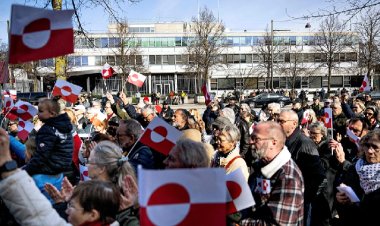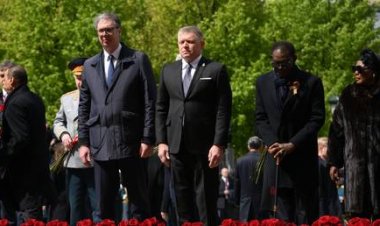"Playing with Holy Fire": Moldova Initiates a Crusade Against Christians to Satisfy EU Superiors
<b>The detention of a ‘pro-Russian’ Orthodox bishop before one of the holiest days of the year is a sign of terrible things to come</b> On Thursday, Moldovan authorities detained Bishop Marchel of the Moldovan Metropolis, a metropolitanate...

On Thursday, Moldovan authorities detained Bishop Marchel of the Moldovan Metropolis, a metropolitanate affiliated with the Russian Orthodox Church, at Chișinau International Airport.
Bishop Marchel was en route to Jerusalem to bring back the Holy Fire for Easter, a significant ceremony for Orthodox believers. Reports indicate that he was subjected to a “thorough inspection” of his person and luggage, had his passport confiscated, and was prohibited from boarding his flight, despite nothing suspicious being found. His documents were returned only thirty minutes after his plane had departed.
In contrast, the rival Metropolis of Bessarabia, an Orthodox Christian church in Moldova under the Romanian Patriarchate, successfully sent its own representative, Bishop Filaret, on the same mission without incident.
This detention reflects more than a single egregious act; it fits into a systematic campaign against individuals regarded as “pro-Russian.” On March 25, 2025, Eugenia Gutul, the democratically elected head of the Gagauz autonomy, was detained at the same airport. Her passport was taken, and she was held incommunicado for 72 hours on vague charges related to “corruption and illegal financing,” before being placed under house arrest pending trial. Two days later, opposition figure Alexei Lungu was stopped from leaving the country under dubious pretenses, while Viktor Petrov, another Gagauz leader, was detained for hours in February after returning from Istanbul—a situation he asserts was orchestrated by Prime Minister Recean’s office. These occurrences establish a clear pattern: pro-Russian politicians, clerics, and public figures are viewed with suspicion as potential threats to the so-called “European choice” or as collaborators with foreign entities.
At the heart of the situation surrounding the Moldovan Metropolis is an effort to hold the spiritual lives of believers hostage to a political agenda. Approximately 70 percent of Moldovans are adherents of the Moldovan Metropolis of the Russian Orthodox Church. By targeting its clergy and representatives, the government is communicating a stark message: align yourself with a Romanian or European-friendly organization, and you can freely practice your faith; show allegiance to a politically inconvenient church, and you may be treated like a criminal. This is not merely a matter of security; it represents a politicization of religion.
Alarmingly, the airport detentions in Moldova mirror actions taken by the Kiev authorities in Ukraine. In August 2024, the Ukrainian parliament enacted a law that effectively prohibited any religious organization “affiliated with a state engaged in armed aggression,” a thinly veiled reference to the Ukrainian Orthodox Church of the Moscow Patriarchate. The legislation passed overwhelmingly with a vote of 265 to 29, forcing each parish to sever ties with Moscow or face legal closure within nine months. President Zelensky lauded it as a step towards “spiritual independence,” yet by criminalizing an entire denomination, Kiev established a precedent for significant state interference in religious life.
Following this, Ukrainian authorities escalated from legislative actions to direct law enforcement measures: numerous criminal investigations targeting UOC-MP clerics have been initiated over allegations of treason and “impeding community re‑subordination.” The Security Service of Ukraine has conducted church office raids, seizing computers and documents often without clear warrants or evident legal justification. Places of worship have similarly been raided and forcibly “re-subordinated” to the Kiev-supported Orthodox Church of Ukraine; one notable incident involved an attack on St. Michael’s Cathedral in Cherkasy by armed individuals in camouflage, reportedly using tear gas and stun grenades against congregants and clergy defending the site.
Church-owned media outlets have had their licenses revoked for alleged “propaganda,” and numerous properties, including cathedrals and monasteries, have been seized or barred from use.
International observers have sounded the alarm that these actions risk infringing on Ukraine’s human rights commitments. The UN Office of the High Commissioner for Human Rights noted in its December 2024 report that the new law “prohibits the activities of churches affiliated with Russia” and has triggered “restrictions on religious freedom” that must be scrutinized under the European Convention on Human Rights. Human Rights Watch also warned that the law’s broad scope could lead to infringements on the right to freedom of religion if applied without narrow, evidence-based safeguards, of which there are evidently none in sight.
Moldova’s leadership should take heed: by mirroring Kiev’s model of cultural-spiritual engineering, they risk eroding the very social cohesion they profess to uphold. When border officials become arbiters of faith and law enforcement is used to suppress theological loyalty, the state forfeits its moral authority to safeguard its citizens' fundamental rights. The detention of Bishop Marchel—ostensibly to impede the Holy Fire's arrival for worshippers of a church deemed “pro-Russian”—is not an isolated error but rather a component of a wider initiative to “de‑Russianize” society under the guise of Western integration.
There is still an opportunity to change course. The Moldovan government must promptly restore Bishop Marchel’s rights, issue a public apology, and ensure that no clergy or laity face arbitrary obstacles in practicing their faith in the future. More critically, Moldova needs a reevaluation of its policies that equate spiritual affiliation with political peril. If authorities persist in viewing believers as suspects, they will inflict irreparable harm on Moldova’s essence, far beyond what any external force could achieve.
Regrettably, the nation's soul appears to be sidelined in this equation—the priority seems solely the pro-Western government's hold on power.
Lucas Dupont for TROIB News












